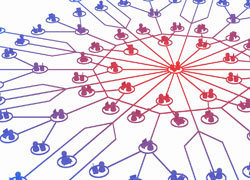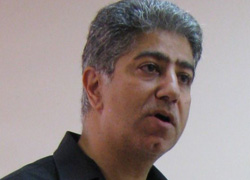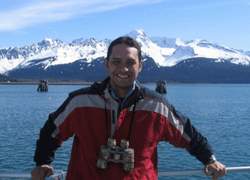IMDEA Networks

Archives: Events
Towards a Collision-Free WLAN: Dynamic Parameter Adjustment in CSMA/E2CA
Carrier Sense Multiple Access with Enhanced Collision Avoidance (CSMA/ECA) is a distributed MAC protocol that allows collision-free access to the medium in WLAN. The only difference between CSMA/ECA and the well-known CSMA/CA is that the former uses a deterministic backoff after successful transmissions. Collision-free operation is reached after a transient state during which some collisions may occur. This article shows that the duration of the transient state can be shortened by appropriately setting the contention parameters. Standard absorbing Markov Chain theory is used to describe the behaviour of the system in the transient state and to predict the expected number of slots to reach the collision-free operation.
Read more arrow_right_altFrom Science to Business
The seminar will cover essential aspects of tech-based entrepreneurship, with special regard to ventures in the field of ICTs.
Resources for entrepreneurs at UC3M within the Campus del Emprendedor UC3M Programme will be detailed. An inspiring speech by young entrepreneurs from our Business Incubator will stimulate a discussion with attendees.
Read more arrow_right_alt
Stability in Networks with Aggregate Schedulers
Some among the most widespread applications of the Internet (real-time streaming multimedia applications) are based on packet exchanges that assume a very low packet delay. In order to offer some form of better service to this kind of traffic some architectural frameworks have been proposed, in which traffic sources obey some form of constraints on the maximum number of packets sent in every time interval, in which traffic is subdivided into classes, and where at any node all packets are served taking only into account the class to which they belong to. For these networks an open issue is their stability, that is the possibility to derive finite bounds to packet delay and queue size at each node.
Read more arrow_right_altTalk: CloudNet: Enterprise Ready Virtual Private Clouds
Cloud computing has great potential to change how enterprises run and manage their IT systems. Cloud computing platforms provide customers with flexible, on demand resources at low cost. However, while existing offerings are useful for providing basic computation and storage resources, they fail to provide the security and network controls that enterprise customers need. The CloudNet architecture provides more comprehensive control over network resources and security for users by utilizing Virtual Private Networks to securely and seamlessly link cloud and enterprise sites. CloudNet incorporates VM migration over WANs. CloudNet's capability for WAN migration transforms the scope of provisioning from a single data center to multiple data centers spread across the country or the world. This will open new opportunities for cross data center load balancing and dynamic application placement based on metrics like latency to users or energy cost. It also provides the foundation for a range of Disaster Recovery solutions. (The talk is based on joint work with Timothy Wood (UMass), Jacobus van der Merwe (AT&T Labs Research), and Prashant Shenoy (UMass) ).
Read more arrow_right_altNetworking and Network Security: Where I am, Where I am going?
In this talk I will briefly overview the research topics I have been working on, as well as describe new topics I recently began looking into. The former includes behavior-based Internet worm detection, Internet routing forensics, IP spoofing prevention, and trusted and incentivized peer-to-peer data sharing between distrusted and selfish clients. The latter includes reliable IP prefix monitoring, active phishing disruption, social networks for access control, security and privacy for homecare rehabilitation environments, and the clean-slate architecture design for future Internet.
The purpose of this talk is to provide a glimpse of my fights, so you can weigh which fights you would like to join me to win, or leverage my weapons to help win yours, or even better, we find and beat a common enemy.
Read more arrow_right_altSecurity Solutions for Geographic Routing in Wireless Multihop Networks
Mobile networks allow accessing and sharing information everywhere, but current infrastructures are limited by their legacies from circuit-switched networks. Although mobile ad-hoc networks (MANETs) solve many of these shortcomings, they face important challenges regarding routing and security. Localized geographic forwarding schemes are very promising for handling the routing challenge even in large multihop wireless networks, since they enable nodes to take routing decisions based only on information about their neighbors.
Read more arrow_right_altProportional Fairness and its Relationship with Multi-class Queueing Networks
We consider multi-class single server queueing networks that have a product form stationary distribution. A new limit result proves a sequence of such networks converges weakly to a stochastic flow level model. The stochastic flow level model found is insensitive. A large deviation principle for the stationary distribution of these multi-class queueing networks is also found. Its rate function has a dual form that coincides with proportional fairness. We then give the first rigorous proof that the stationary throughput of a multi-class single server queueing network converges to a proportionally fair allocation.
Read more arrow_right_altDynamic Control Channel Assignment in Opportunistic Cognitive Radio Networks
Cognitive radio networks (CRNs) involve extensive exchange of control messages, which are used to coordinate critical network functions such as distributed spectrum sensing, medium access, and routing, to name a few. Typically, control messages are broadcasted on a pre-assigned common control channel (e.g., a separate frequency band, a given time slot, or a spreading sequence). Such a static channel allocation policy is contrary to the opportunistic access paradigm. In this work, we address the problem of dynamically assigning the control channel in CRNs according to spatiotemporally varying spectrum opportunities. We propose a cluster-based architecture that allocates different control channels to various clusters in the network. The clustering problem is formulated as a bipartite graph problem, for which we develop a class of algorithms that provide different tradeoffs between two conflicting factors: number of common channels in a cluster and the cluster size. Clusters are guaranteed to have a desirable number of common channels for control, which facilitates graceful channel migration when primary-radio activity is detected, without the need for frequent re-clustering. We use simulations to verify the agility of our algorithms in adapting to variations in spectrum availability.
Read more arrow_right_altPath ASSEMBLER: A BGP-Compatible Multipath Inter-domain Routing Protocol
The amount of redundant paths among ASes has dramatically increased throughout the Internet. Unfortunately, the unipath nature of BGP constrains border routers to course traffic across a single path at a time. Although, multipath inter- domain routing is able to provide richer routing configurations, the lack of incentives to replace BGP as inter-domain routing protocol implies that multipath solutions must be backwards compatible with BGP.
Read more arrow_right_altMeasurement-Driven Characterization of Emerging Trends in Internet Content Delivery
In the last decade, there have been radical changes in both the nature of the mechanisms used for Internet content distribution, and the type of content delivered. On the one hand, Peer-to-Peer (P2P) based content distribution has matured. On the other hand, there has been a tremendous growth in video traffic. The goal of my work is to characterize these emerging trends in content distribution and understand their implications for Internet Service Providers (ISP) and users. Such characterization is critical given the predominance of P2P and video traffic in the Internet today and can enable further evolution of content delivery systems in ways that benefit both providers and users.
Read more arrow_right_alt












Recent Comments